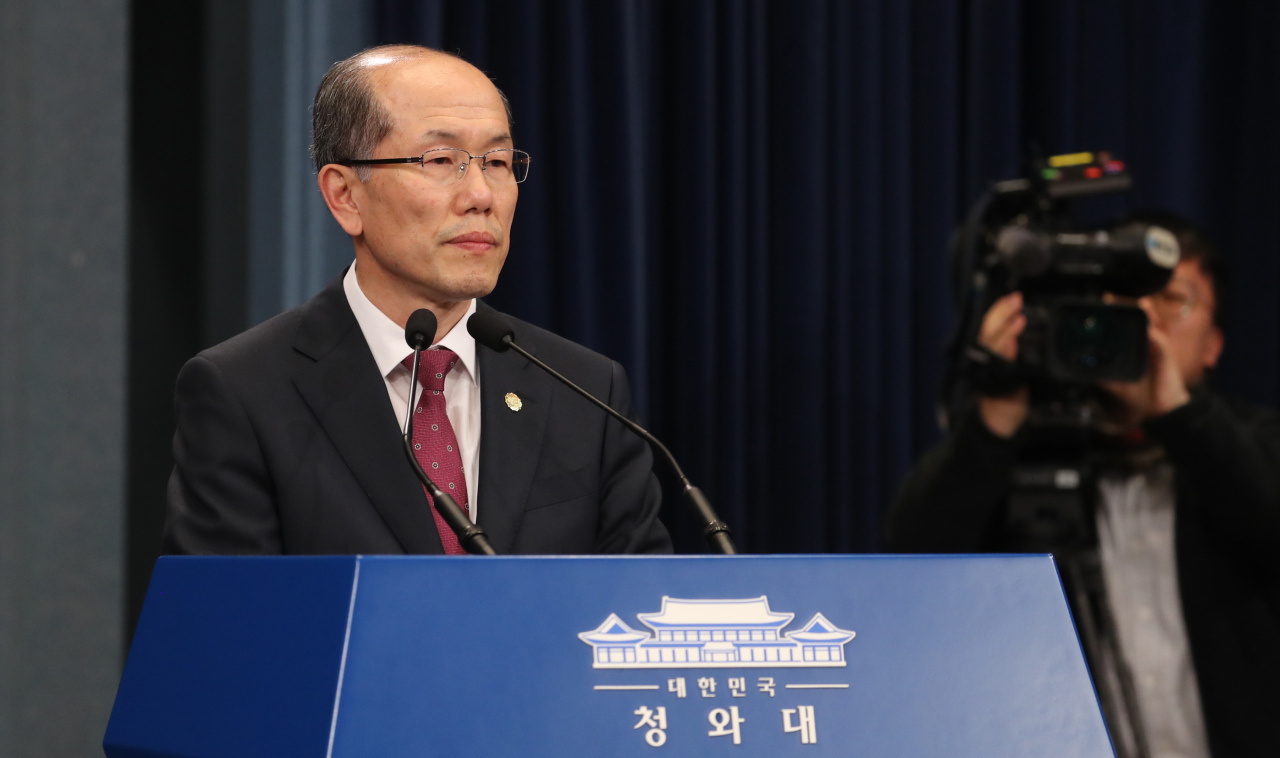Top Seoul official warns Japan against provocations over trade, GSOMIA
By Choi He-sukPublished : Nov. 24, 2019 - 19:19
BUSAN -- Japan should refrain from provoking South Korea over the trade and military information sharing agreement, a high-level government official said Sunday.
Chung Eui-yong, Seoul's national security office chief, also said that Seoul lodged a firm complaint over Japanese government’s announcement on Friday, and said that Tokyo offered an apology and confirmed that the Seoul-Tokyo agreement remains the same.
Chung went on to issue a warning to Tokyo saying that he would like to say “try me” to Japan, going on to explain that the phrase is “a warning when one side makes groundless claims to provoke the other.”
Chung Eui-yong, Seoul's national security office chief, also said that Seoul lodged a firm complaint over Japanese government’s announcement on Friday, and said that Tokyo offered an apology and confirmed that the Seoul-Tokyo agreement remains the same.
Chung went on to issue a warning to Tokyo saying that he would like to say “try me” to Japan, going on to explain that the phrase is “a warning when one side makes groundless claims to provoke the other.”

On Friday, Seoul and Tokyo announced agreed measures that resulted in South Korea putting the effect of its decision on ending General Security of Military Information Agreement on hold at 6 p.m., six hours before the agreement was set to end.
Under the agreement, the two sides will hold trade talks concerning Japan’s trade restrictions -- in August it removed Korea from its whitelist of trusted trade partners and in July it began applying stricter regulations to exports of key semiconductor materials to Korea.
Japan, however, made the announcement some seven minutes after the agreed upon time, and added claims such as that South Korea admitted to having faults in its exports monitoring system and offered to put WTO proceedings on hold in return for Tokyo engaging in talks.
Chung categorically refuted the claims coming out of Japan.
“One is that Japan said that negotiations began after we informed them of halting WTO procedures. This is not true,” Chung said, listing South Korea’s attempts to engage Japan in talks that were turned down by Tokyo.
“After the decision to end GSOMIA was announced on Aug. 23, (Japan) suggested dialogue, and negotiations began through diplomatic channels.”
The official also denied that Seoul had admitted to any flaws in its trade regulation system, saying that the two sides agreed to discuss trade issues by verifying Seoul’s regulations that are in place.
In applying trade curbs, Japan claimed that South Korea’s trade regulations were lax and that materials that could be used for weapons development slipped through Seoul’s system.
Chung also said Japanese media reports claiming victory for Tokyo in the dispute are false as Seoul stuck to its principles while Tokyo did not.
Since the announcement, Japanese government officials have been cited by Japanese media as saying that Seoul bowed to pressure from the US to maintain GSOMIA. Japanese media have also reported that Tokyo officials view the development as a “win,” claiming that Japan made no concessions to Korea.
By Choi He-suk (cheesuk@heraldcorp.com)


















![[KH Explains] Hyundai's full hybrid edge to pay off amid slow transition to pure EVs](http://res.heraldm.com/phpwas/restmb_idxmake.php?idx=652&simg=/content/image/2024/04/18/20240418050645_0.jpg&u=20240418181020)

![[Today’s K-pop] Zico drops snippet of collaboration with Jennie](http://res.heraldm.com/phpwas/restmb_idxmake.php?idx=642&simg=/content/image/2024/04/18/20240418050702_0.jpg&u=)